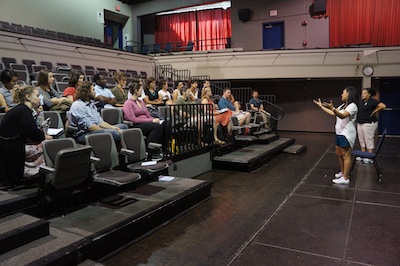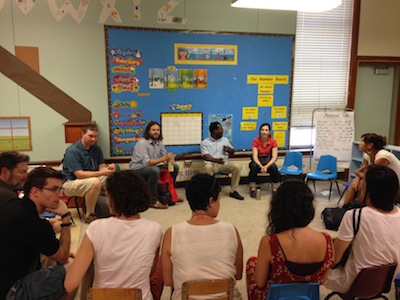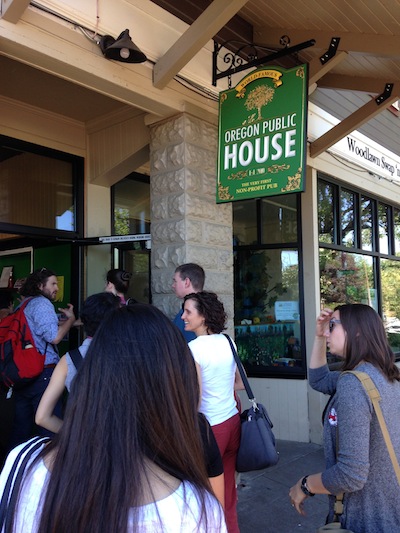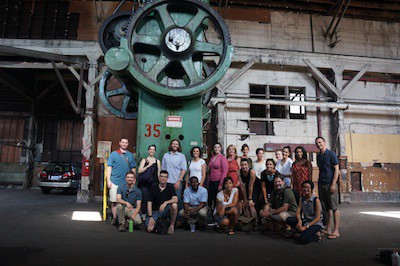Posts filed under ‘Social Entrepreneurship’
Portland’s Business Incubators and Accelerators
In the latest Federal rankings, Oregon is fourth among US states in job growth, and Portland is eighth among all US cities. How does a small city like Portland create a large footprint in the startup world, while stimulating employment and economic development? We think it’s partly thanks to a great and growing base of programs offering assistance to small businesses. After several years of rapid growth, there are now 35 business incubators, accelerators, and support programs in the Portland area.
Beyond working space and crucial programs like mentoring, skills-building, and networking, you may be surprised what resources you can find in this ecosystem of supporting organizations. Need a commercial kitchen? A pop-up shop downtown? A 3-D printer? Alongside the Portland Business Journal’s recent Portland Incubator Roundup, we hope this post serves as your 2016 directory for local incubators helping small businesses thrive. Let us know in the comments if we missed anyone!
I. Incubators for Social Impact Ventures

Impact Entrepreneurs: Embedded in PSU’s School of Business Administration, Impact Entrepreneurs provides an online Certificate in Social Innovation for students and community members, the Social Innovation Incubator for more established ventures, and leadership trainings for the staff of large organizations.
 HATCH: A set of linked offerings for social entrepreneurs and community businesses, Hatch offers co-working and office space, member workshops and public events, and a platform for equity crowdfunding in Oregon.
HATCH: A set of linked offerings for social entrepreneurs and community businesses, Hatch offers co-working and office space, member workshops and public events, and a platform for equity crowdfunding in Oregon.
II. General Business Incubators, Accelerators, and Co-working Spaces
 Best HQ: A business incubator, best HQ provides the support and resources for entrepreneurs to establish and grow their companies, in addition to providing workspace and management and leadership training.
Best HQ: A business incubator, best HQ provides the support and resources for entrepreneurs to establish and grow their companies, in addition to providing workspace and management and leadership training.
 CENTRL Office: A collaborative workspace in Portland’s Pearl District providing flexible full-service workspace for leading entrepreneurs, free agents, start ups, and work groups in the historic GE Supply Co. building.
CENTRL Office: A collaborative workspace in Portland’s Pearl District providing flexible full-service workspace for leading entrepreneurs, free agents, start ups, and work groups in the historic GE Supply Co. building.
Entrepreneurs’ Organization Portland Accelerator![]() : Provides educational small-group meetings for entrepreneurs and ties to EO’s global network of successful business owners.
: Provides educational small-group meetings for entrepreneurs and ties to EO’s global network of successful business owners.
 Forge Portland: Forge is a shared workspace where members have access to free accounting templates, legal referral, business
Forge Portland: Forge is a shared workspace where members have access to free accounting templates, legal referral, business
development, mentorship and intern placement.
 The Indus Entrepreneurs (TiE): Designed to accelerate the successful development of member companies, TiE provides support services including rental space, an incubator program, pitch sessions, and mentors.
The Indus Entrepreneurs (TiE): Designed to accelerate the successful development of member companies, TiE provides support services including rental space, an incubator program, pitch sessions, and mentors.
 Mercy Corps NW: Mercy Corps NW supports small businesses and entrepreneurs through microloans, matched business grants, and small business classes taught by business professionals.
Mercy Corps NW: Mercy Corps NW supports small businesses and entrepreneurs through microloans, matched business grants, and small business classes taught by business professionals.
 NedSpace: This co-working resource has 14,000 square feet of great office space in the heart of downtown Portland for co-working, startups, entrepreneurs and remote workers.
NedSpace: This co-working resource has 14,000 square feet of great office space in the heart of downtown Portland for co-working, startups, entrepreneurs and remote workers.
![]() Oregon Entrepreneurs Network (OEN): OEN is the parent organization for Angel Oregon and the Young Entrepreneurs Society of Portland, and hosts a number of events and workshops designed for businesses at every stage of launch and growth.
Oregon Entrepreneurs Network (OEN): OEN is the parent organization for Angel Oregon and the Young Entrepreneurs Society of Portland, and hosts a number of events and workshops designed for businesses at every stage of launch and growth.
 The Professional Collective: A co-working space in Hillsboro with networking and educational events for entrepreneurs.
The Professional Collective: A co-working space in Hillsboro with networking and educational events for entrepreneurs.
SCORE: Score is a nationwide nonprofit organization dedicated to the formation, growth and success of small business![]() es with free personal counseling, ongoing mentoring, and 100+ high quality, modestly-priced workshops each year.
es with free personal counseling, ongoing mentoring, and 100+ high quality, modestly-priced workshops each year.
 Small Business Development Centers (SBDC): FREE to Oregon businesses and entrepreneurs, SBDC services include financial, marketing, production, organization, and international trade and feasibility studies.
Small Business Development Centers (SBDC): FREE to Oregon businesses and entrepreneurs, SBDC services include financial, marketing, production, organization, and international trade and feasibility studies.
 Starve Ups: A virtual incubator and accelerator with peer mentoring as its cornerstone, Starve Ups is an end-to-end educational approach helping companies to survive, strive and thrive.
Starve Ups: A virtual incubator and accelerator with peer mentoring as its cornerstone, Starve Ups is an end-to-end educational approach helping companies to survive, strive and thrive.
 Startup PDX Challenge: Hosted by the Portland Development Commission, this annual competition connects startups to Portland’s growing entrepreneurial ecosystem and provides funding and workspace.
Startup PDX Challenge: Hosted by the Portland Development Commission, this annual competition connects startups to Portland’s growing entrepreneurial ecosystem and provides funding and workspace.
![]() TenX: An open source, business frameworks education company, TenX provides content, events, conferences & learning programs to generate growth & acceleration for high potential organizations & individuals.
TenX: An open source, business frameworks education company, TenX provides content, events, conferences & learning programs to generate growth & acceleration for high potential organizations & individuals.
![]() WeWork Custom House: The Portland branch of the well-known global co-working/event space and entrepreneurial community.
WeWork Custom House: The Portland branch of the well-known global co-working/event space and entrepreneurial community.
III. Tech Incubators and Accelerators
e1ectr0n![]() : A hardware incubator, powered by Axiom Electronics, that provides manufacturing and engineering capability to startups.
: A hardware incubator, powered by Axiom Electronics, that provides manufacturing and engineering capability to startups.
![]() Jaguar Land Rover Innovation Incubator: Focused on supporting technology startups developing new in-car entertainment, communications, and interaction technology.
Jaguar Land Rover Innovation Incubator: Focused on supporting technology startups developing new in-car entertainment, communications, and interaction technology.
 Oregon BEST: The Built Environment and Sustainable Technologies Center provides funding, grant connections, links to investors, and research and commercialization support for cleantech entrepreneurs.
Oregon BEST: The Built Environment and Sustainable Technologies Center provides funding, grant connections, links to investors, and research and commercialization support for cleantech entrepreneurs.
 Oregon Technology Business Center (OTBC): OTBC helps entrepreneurs identify and attain their goals at every stage by providing entrepreneurs with office space, access to coaching, workshops and seminars.
Oregon Technology Business Center (OTBC): OTBC helps entrepreneurs identify and attain their goals at every stage by providing entrepreneurs with office space, access to coaching, workshops and seminars.
 The OTRADI Bioscience Incubator (OBI): A bioscience-specific accelerator that provides scientists and young companies with the resources and expertise needed to take their research from the lab to the market.
The OTRADI Bioscience Incubator (OBI): A bioscience-specific accelerator that provides scientists and young companies with the resources and expertise needed to take their research from the lab to the market.
 Portland Seed Fund: The Portland Seed Fund is a privately managed fund and non-resident accelerator focused on providing emerging companies the capital, mentoring and connections to propel them to the next level.
Portland Seed Fund: The Portland Seed Fund is a privately managed fund and non-resident accelerator focused on providing emerging companies the capital, mentoring and connections to propel them to the next level.
 Portland Startup Weekend: A 54-hour frenzy of business model creation, coding, designing, and market validation, Startup Weekend brings together developers, designers and business people to build applications and develop a commercial case.
Portland Startup Weekend: A 54-hour frenzy of business model creation, coding, designing, and market validation, Startup Weekend brings together developers, designers and business people to build applications and develop a commercial case.
 Portland State Business Accelerator (PSBA): Recognized by the NBIA as the top tech incubator in the US, and by UBI as one of the top 25 in the world, the PSBA offers office and lab space, networking events, and educational workshops for tech and bioscience startups.
Portland State Business Accelerator (PSBA): Recognized by the NBIA as the top tech incubator in the US, and by UBI as one of the top 25 in the world, the PSBA offers office and lab space, networking events, and educational workshops for tech and bioscience startups.
IV. Creative, Craft, Culinary and Design Incubators and Accelerators
![]() ADX: ADX is a 12,000-square foot facility that combines membership, fabrication services, classes and co-working to make ADX a hub for design and innovation in Portland.
ADX: ADX is a 12,000-square foot facility that combines membership, fabrication services, classes and co-working to make ADX a hub for design and innovation in Portland.
 KitchenCru: A shared-use community kitchen and culinary incubator that supports culinary entrepreneurs in developing, operating, and growing a successful business.
KitchenCru: A shared-use community kitchen and culinary incubator that supports culinary entrepreneurs in developing, operating, and growing a successful business.
 Oregon State University Food Innovation Center: The Food Innovation Center partners with the Department of Food Science and Technology to provide educational programs and with the SBDC to provide support to local food startups.
Oregon State University Food Innovation Center: The Food Innovation Center partners with the Department of Food Science and Technology to provide educational programs and with the SBDC to provide support to local food startups.
 Oregon Story Board Accelerator: Through mentorship, co-working space, collaboration and networking, the Oregon Storyboard Accelerator is helping a budding industry of digitally-enabled storytellers thrive in Oregon.
Oregon Story Board Accelerator: Through mentorship, co-working space, collaboration and networking, the Oregon Storyboard Accelerator is helping a budding industry of digitally-enabled storytellers thrive in Oregon.
 PCC Getting Your Recipe to Market : In an intensive 14 weeks, this program will help you make your culinary idea commercial ready, with food industry experts that will take you step by step to produce, promote, and sell your product.
PCC Getting Your Recipe to Market : In an intensive 14 weeks, this program will help you make your culinary idea commercial ready, with food industry experts that will take you step by step to produce, promote, and sell your product.
![]() PNCA Bridge Lab: Provides entrepreneurship development and resources for artists by helping artist-entrepreneurs focus your vision, connect you with business resources, and assist you in building your own personal network in the Portland creative community.
PNCA Bridge Lab: Provides entrepreneurship development and resources for artists by helping artist-entrepreneurs focus your vision, connect you with business resources, and assist you in building your own personal network in the Portland creative community.
V. Incubators and Accelerators for Women and Minority-owned Businesses
 Portland State University Business Outreach Program (BOP): Helps local small businesses, including emerging minority and women-owned businesses, achieve their potential by providing technical assistance and business consulting services.
Portland State University Business Outreach Program (BOP): Helps local small businesses, including emerging minority and women-owned businesses, achieve their potential by providing technical assistance and business consulting services.
 Hacienda CDC Community Economic Development: Serving low income microentrepreneurs at any stage of business development, the organization offers a culturally-specific Microenterprise Program that incubates businesses by providing training, access to capital and selling opportunities, affordable commercial kitchen rental and, in the future, retail space at the Portland Mercado.
Hacienda CDC Community Economic Development: Serving low income microentrepreneurs at any stage of business development, the organization offers a culturally-specific Microenterprise Program that incubates businesses by providing training, access to capital and selling opportunities, affordable commercial kitchen rental and, in the future, retail space at the Portland Mercado.
 Micro Enterprise Services of Oregon (MESO): MESO improves the economic opportunities of underserved individuals through empowerment, education, and entrepreneurship for the benefit of families in the greater
Micro Enterprise Services of Oregon (MESO): MESO improves the economic opportunities of underserved individuals through empowerment, education, and entrepreneurship for the benefit of families in the greater
community.
 Oregon Association of Minority Entrepreneurs: Participants in the Association can access the Incubator With Walls or the Incubator Without Walls. Both offer market rates, individual technical assistance, counseling with OAME’s staff or volunteers, cooperative marketing and business growth, and development support.
Oregon Association of Minority Entrepreneurs: Participants in the Association can access the Incubator With Walls or the Incubator Without Walls. Both offer market rates, individual technical assistance, counseling with OAME’s staff or volunteers, cooperative marketing and business growth, and development support.
 Women Of Mindful Business (WOMB): WOMB helps women create a natural framework for business and marketing efforts, and
Women Of Mindful Business (WOMB): WOMB helps women create a natural framework for business and marketing efforts, and
is a platform for collaboration with a small group of heart-centered entrepreneurs and opportunity to learn to weave the feminine into your business.
![]() Women’s Plaza: opening in 2016, Women’s Plaza will offer co-w0rking space, childcare, catered meals, wellness advisors, and networking opportunities.
Women’s Plaza: opening in 2016, Women’s Plaza will offer co-w0rking space, childcare, catered meals, wellness advisors, and networking opportunities.
Note: we periodically update this post to ensure that it remains timely. Last update: April 18, 2016. Header photo by Cacophony, used through CC Attribution-Share Alike license.
Bread, Dreams, and Second Chance Employment: One Intrapreneur’s Story
This interview features Genevieve Martin who will be presenting at the 2016 Elevating Impact Summit along with Dave’s Killer Bread CEO, John Tucker in an intimate interview with PSU Assistant Professor Rachel Cunliffe. Tickets for the Summit are available here.
Before the Impact Entrepreneurs team met Genevieve Martin in person, she was a student in PSU’s online Certificate in Social Entrepreneurship and Innovation at PSU. She was an intrapreneur, beginning to develop a new social venture inside an existing company.

Genevieve Martin, Director, Dave’s Killer Bread Foundation
Over the course of the next year, Genevieve skillfully applied the social innovation tools from the certificate to her real-life professional challenge. By the time we went to visit her work, at the Dave’s Killer Bread Breadquarters, Genevieve was already launching the Dave’s Killer Bread Foundation. We sat down with her to hear her story.
Impact Entrepreneurs: What’s your history with Dave’s Killer Bread?
Genevieve Martin: I was hired five and a half years ago by Dave’s Killer Bread to start the Killer Café. At the time, the headquarters and production facilities just had this tiny little break room, so my job was to make it into a place where every employee would receive free, nutritious meals, snacks and beverages . My previous experience was in managing front and back of house operations with food service ventures, so this all seemed within reach.
But my job grew quickly. One of my new responsibilities included running the small company store and its donations, which were from a percentage of store profits and product. The donations were given as unofficial, no-strings-attached gifts and at that point the criteria for giving was that the recipient was an organization near and dear to the family’s heart. Everything we donated was coming directly off the shelves of the store.
While we loved giving the stuff away, we were losing a potential chunk of profit in the process. Being a little more “corporate America” minded, I thought, let’s create some structure here. This part was easy! We hired someone to help with requests and outreach, and then, two years ago came up with a formal grant program to decide who we gave to, and why. We provided donations to a variety of organizations from yoga programs, to youth programs, to conservation. They didn’t exactly relate to second chance employment, but at least we had a giving structure in place.
IE: Then what happened that put you in the second chance employment space?
GT: So it’s a kind of sad story. First, I should point out that we’ve always hired people with criminal backgrounds. But two years ago we lost a couple of internal leaders to recidivism and drug use in quick succession. They had both started at Dave’s as hourly workers and been promoted up within their departments with supervisory responsibility. John Tucker, our new CEO surprised us. Instead of saying, “let’s stop doing this,” John said, “what are we not doing?” I knew then that this guy was serious.
From there we piloted a few programs, including a peer mentoring program and a leadership skills series to see what might work best. Finally we just started collecting and sharing a bunch of resources where we could point people who were struggling. With that one, we started to see a change. People saw that we weren’t just a place to punch in and punch out.
Another outcome from the pilots was that we realized we need to understand the reentry landscape better. We knew it was important to hire people with criminal backgrounds, and we were really proud of doing that, but it kind of ended there. So I proposed we host an event where we would bring together government and nonprofit, and any business partner that was interested in talking about the state of reentry. My goal was 50 people and we ended up with 86. It was standing room only at the Westin, and everyone was leaning in. Halfway through that event John came up to me and said, “You need to hire another you.” I said, “Really? Are you officially telling me I can do that?” He said, “Yes, let’s talk next week.” Three months later ‘dI hired our now full-time foundation Program Manager and was in a position to propose and execute next steps. Which was…. amazing…and really scary.
The conference revealed that what is missing from the landscape are employers willing to accept people with criminal backgrounds and openly discuss it. We chose to create a corporate foundation because it would allow us to leverage additional funding streams, rather than keep it in house. It also built in the added commitment that this work is so important that it can stand on its own. .
IE: Can you say the Mission of Dave’s Killer Bread Foundation?
GT: To expand employment opportunities for people with criminal backgrounds.
IE: What were your big questions now that it was your job to start a corporate giving foundation?
(Laughs)… Well, for me this was another “holy !#$%^& moment” where I had to grapple with what I was doing here. John Tucker’s confidence in me was encouraging but I needed some more credibility for myself, for external partnerships, and honestly, for internal people to take me seriously. So I started researching nonprofit and leadership management programs. To be honest, academics wasn’t my strong suit growing up and I was hesitant to jump into a laborious program, fearing that I’d be setting myself up for failure.
After researching non-profit leadership courses, degrees and certifications I stumbled upon the Business of Social Innovation Certificate at PSU.. I thought this sounds pretty amazing and I immediately emailed for info. After talking to Abby at PSU’s Impact Entrepreneurs I was pretty sure it was what I should be doing, so I took it to John. He was so supportive and offered to move around budgets to cover the cost. It’s a very strange and wonderful feeling to have someone you’ve known a short time see that this is what you are supposed to be doing and make it possible.
IE: What have been the most relevant tools you’ve acquired through the certificate program that will help you accelerate this initiative at DKB?
The Human Centered Design piece, which was something I hadn’t heard about before, was huge, especially in the beginning. We still use the Business Model Canvas, and I have been using the empathy model from the Business Model Generation book as we put together our corporate goals. We’ve actually been using the Business Model Canvas for each department. Next year the café will do one as an assessment, and the same with the store. That resource was huge. It constantly pops up for me.
The customer development interviews, while they seem so simple and straightforward, were massively helpful and new to us. For example, one of our big pieces of work was writing the Second Chance Playbook. We had all these expert pieces of it, and were really struggling to get all the right content in there. Meanwhile, we’re doing the customer development interviews with really fantastic HR professionals who are excited about the work we’re doing, but who tell us basically that they’re not going to have time to read a book. I stopped in my tracks. Of course they don’t! That was my idea to write a book, and I don’t even have time to read one. See all those books on my wall? Those are my you-should-read-these-sometime books, and of course I never do. So that’s completely changed one of our programs. It’s currently in production to be an online set of modules with downloadable content, a program that HR professionals can use as their time permits..
It was uncomfortable to do the customer interviews at first. I’m an introvert by nature and not a salesperson, so at first it was hard to approach people asking them to talk to me as a representative of Dave’s Killer Bread. But then I realized I had this great advantage in that I could say it was for a class project and when I did that, everyone responded very positively. It was so much easier. I recommend every student leverage that.
IE: What kind of influence do you think Dave’s Killer Bread Foundation will have?
GT: I think there’s potential for it to change the way people are employed, but there’s a long way to go before we see that. The wonderful thing about this work is that it’s ripe right now. There’s a national movement, more people are seeking information, and it’s a great opportunity for us to share what we know. Now it comes down to how we play it out. We have a new acquisition that has a ton of potential for how far we reach, both with our product and our message. The only thing that will get in our way at this point is ourselves!
Learning Social Enterprise from Local Changemakers
“It’s both relieving and scary to see there isn’t a playbook for this kind of thing,” one student reflected during a tour of social enterprises in Portland, OR. She was one of seventeen students who spent the summer of 2015 studying operational excellence as part of Portland State University’s Business of Social Innovation Certificate.
As a part of the summer class, students traveled to six sites around Portland to meet with local social entrepreneurs and learn firsthand about their experiences. Their reflections from each site visit show that the perspectives on social innovation were at once personal and universal for entrepreneurs tackling social and environmental problems.
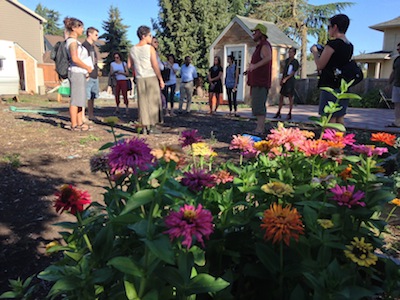
“Scott encouraged us to know the existing systems we’re working on, so we can challenge them and create new ones.“
Led by Scott Davison, Vocoform helps young adults facing poverty, addiction, and racial injustice identify and pursue jobs through skill development, life coaching, and enterprise operation/ownership. Launched in 2014, the ½ acre Arbor Lodge Urban Farm in North Portland is an enterprise training lab for Vocoform. The farm facilitates 20-25 internships each summer for youth 18-25.
“SEI’s model [is] focused on building human relationships and supporting children in every aspect of their lives to help them succeed.”
Self Enhancement Inc. (SEI) recently launched The Pathways to Prosperity Initiative, an intrapreneurial program of SEI that provides at-risk urban youth and their families in the Portland area with the knowledge, skills and support needed to leverage economic opportunities and increase financial capability. SEI Academy is the only Title I model school in Portland, ranking in the top 5% statewide among schools that serve high-poverty student populations.
“Breaker Project and Construct Foundation exemplified the importance of metrics and assessment to understand the impact of the work you’re doing.”
Construct Foundation is building a portfolio of partners and education initiatives to identify and support new models for teaching and learning, prioritizing K-12 students. Construct Foundation partnered with Breaker Project, an alternative learning model that combines design thinking and challenge based learning, in an entrepreneur boot camp that connects participants to real world problems.
“Ryan Saari just had this sense of unstoppable of optimism and purpose.”
The Oregon Public House, where students had lunch, is the nation’s first nonprofit pub. The pub pledges to donate its profits to charity, and customers select the charity their purchase supports. The Board of Directors and Staff are also committed to creating a space that’s accessible and “diverse as the neighborhood that surrounds it.” In two years the Oregon Public House has donated more than $50,000 to mission-driven nonprofits and charities.
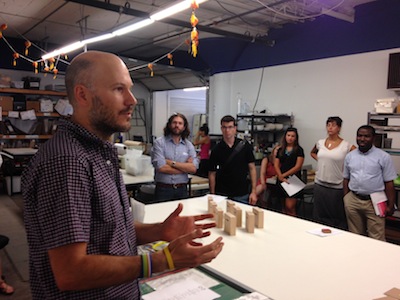
“The lean systems strategies at Plywerk are eliminating wasted resources and time inefficiencies.”
Plywerk is an eco-conscious photo mounting and art panel company that is committed to a triple bottom line operating philosophy, and that utilizes the four systems conditions of the “Natural Step Framework” to assess the lifecycle of every aspect of the business. Plywerk is a lean manufacturer that strives to avoid and eliminate waste to add value to the product.
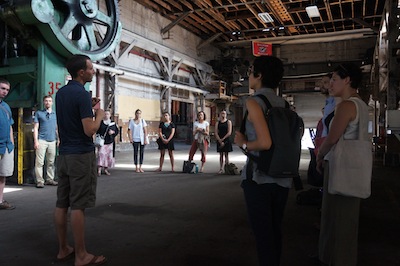
“Ecotrust was able to identify what it is they do really well, and keep that a part of the business model as they grew.”
The Redd is a 1918 industrial ironworks and contemporary warehouse that Ecotrust has purchased and is transforming into a working urban ecosystem for the regional food economy. It aims to incubate young businesses and connect them to Oregon resources. The Ecotrust website states: “The Redd will serve “ag in the middle,” mid-size rural farmers, ranchers, and fishers who have outgrown direct-to-consumer channels, such as CSAs and farmers’ markets, and are looking to scale their business.”
The students experienced social entrepreneurship in real life, in a local context, alongside their peers. They asked difficult questions, and debriefed each visit while traveling on a the bus from one site to another. Some people say you have to view social entrepreneurship in action to understand it. The summer 2015 class jumped in.
Partnering with Youth in 2015
By Cindy Cooper, Co-founder & Director, PSU’s Impact Entrepreneurs
One of my favorite quotes from our 2013 Elevating Impact Summit was when Eric Dawson, Co-founder & President of Peace First, said, “Children aren’t the future. Children are the present.”
I’ve since thought a lot about the opportunity Eric laid out before us.
An Ashoka U Changemaker Campus, Portland State University is considered one of the world’s leading universities for making changemakers and inspiring action for a better world. I wondered how Impact Entrepreneurs, as a program in a university, could situate youth in our efforts to inspire, incubate and accelerate impact through the promise of business.
Then, I met George Zaninovich who knows a lot about tapping into the power of youth. George created PLACE: Planning and Leadership Across City Environments. A program of Portland’s Catlin Gabel school, PLACE provides high school students and recent graduates from any regional school with an opportunity to lead civic and urban planning projects that create positive change in Portland. For example, designing solutions to food insecurity in outer SE Portland in partnership with Zenger Farm, and developing transportation solutions and enhancing the safety on the Powell corridor with the Bureau of Planning and Sustainability.
In its seventh year, PLACE has engaged thousands of Portlanders in its projects and worked with hundreds of students from 18 high schools. PLACE has even made its program open source by creating a comprehensive curriculum guide that has been downloaded in more than 50 cities across the world.
Talking with George, we found shared learning goals and beliefs with one big difference: Where PLACE’s experiential projects are defined by the needs of community leaders and urban environments, Impact Entrepreneurs roots its hands-on learning in identifying and pursuing personal purpose for social change. This is the type of complementarity that collective impact is made from!
The decision to work together was a no-brainer, and over many months we co-created an approach that integrates Impact Entrepreneurs’ into PLACE’s 2015 summer program. The collaboration means that 24 PLACE students will explore personal changemaking through the lens of social innovation. They will meet inspiring innovators, examine best practices, and engage in activities to develop their own purpose and pathways toward making a lasting difference.
PLACE’s 2015 program starts July 6th. We’ll bring you updates as we go. Let the changemaking begin!

Jacen Greene, Impact Entrepreneurs, & George Zaninovich, PLACE
June 9, 2015 at 4:53 pm Impact Entrepreneurs at Portland State University Leave a comment
Three Key Lessons for Changemakers Everywhere
 This post was contributed by Nadya Okamoto, Executive Director of Camions of Care, and Youth Director of Social Venture Partners Youth.
This post was contributed by Nadya Okamoto, Executive Director of Camions of Care, and Youth Director of Social Venture Partners Youth.
I’m Nadya Okamoto, a 17-year-old in Portland, OR determined to make a difference, and founder and executive director of Camions of Care (COC). COC is a nonprofit organization based here in Portland that strives to address the natural needs of homeless women primarily through the distribution of feminine hygiene product care packages. In the last six months, we have distributed over 1,500 care packages to women in Portland, Connecticut, South Dakota, Salt Lake City, and Guatemala, and we are hoping to expand that network of outreach as we gain more support.
Last month was the 2015 Changemakers Night hosted in partnership by Social Venture Partners and Impact Entrepreneurs at Portland State University. I had the unbelievable honor of playing a role in the event as the emcee, and was given the opportunity to tell my story as a young and aspiring changemaker, as well as to introduce three inspiring new role models of mine. Throughout the event, through listening to the three keynote speakers talk, and hearing about the work of many of the attendees, I learned three unforgettable lessons that are key to being a changemaker:
 1) Build your work around your purpose: The people at Changemakers Night were not just savvy in their fields of work, but were passionate about their personal missions. Being a changemaker takes a lot of work and a lot of hours advocating, connecting, and implementing programs, and one cannot accomplish that to their greatest extent without putting relentless energy toward reaching their goal. Thus, identifying that purpose is key to ensuring that you have the determination and authenticity to make your mark. I believe that this concept was embodied by one of the featured speakers, Jeremy Hockenstein, who weaved together his passion for business, international nonprofit work, and technology to create Digital Divide Data. Digital Divide Data is pioneering an “impact sourcing” model to provide education, professional development, and technology-related jobs for young people in underserved communities around the world.
1) Build your work around your purpose: The people at Changemakers Night were not just savvy in their fields of work, but were passionate about their personal missions. Being a changemaker takes a lot of work and a lot of hours advocating, connecting, and implementing programs, and one cannot accomplish that to their greatest extent without putting relentless energy toward reaching their goal. Thus, identifying that purpose is key to ensuring that you have the determination and authenticity to make your mark. I believe that this concept was embodied by one of the featured speakers, Jeremy Hockenstein, who weaved together his passion for business, international nonprofit work, and technology to create Digital Divide Data. Digital Divide Data is pioneering an “impact sourcing” model to provide education, professional development, and technology-related jobs for young people in underserved communities around the world.
 2) Embrace what sets you apart: Everyone brings a unique perspective composed of our backgrounds, experiences, skills, and passions. As we embrace our differences, we bring new and important insights to address complex and entrenched social problems. For me, an experience that may be classified as “different,” but also gives me my driving force to lead Camions of Care, is my family’s own experience with not being able to live in our apartment and having to transition into living under the legal label of “homelessness” for a period of time. I was inspired at Changemakers Night by Jane Stevens, a journalist and researcher who leveraged her unique set of skills and opportunities to begin shifting social perspectives and address the effects of toxic stress and Adverse Childhood Experiences (ACES) with her organizations Aces Connection and Aces Too High.
2) Embrace what sets you apart: Everyone brings a unique perspective composed of our backgrounds, experiences, skills, and passions. As we embrace our differences, we bring new and important insights to address complex and entrenched social problems. For me, an experience that may be classified as “different,” but also gives me my driving force to lead Camions of Care, is my family’s own experience with not being able to live in our apartment and having to transition into living under the legal label of “homelessness” for a period of time. I was inspired at Changemakers Night by Jane Stevens, a journalist and researcher who leveraged her unique set of skills and opportunities to begin shifting social perspectives and address the effects of toxic stress and Adverse Childhood Experiences (ACES) with her organizations Aces Connection and Aces Too High.
 3) Consider connections: It was at Changemakers Night that I reached a deeper understanding on the importance of connections. My epiphany on this was spurred by Kazi Huque’s speech. As the CEO of Grameen Intel Social Business, he leads a partnership between Grameen Bank and Intel Corporation spreading IT services to a whole new market on a global scale. As a leader, empowering others is central to growing a movement, and to gain inspiration from others is forever a possibility. Connections not only enable your work to spread beyond your own fingertips, but they also help generate a cohesive community that strives for a happier world.
3) Consider connections: It was at Changemakers Night that I reached a deeper understanding on the importance of connections. My epiphany on this was spurred by Kazi Huque’s speech. As the CEO of Grameen Intel Social Business, he leads a partnership between Grameen Bank and Intel Corporation spreading IT services to a whole new market on a global scale. As a leader, empowering others is central to growing a movement, and to gain inspiration from others is forever a possibility. Connections not only enable your work to spread beyond your own fingertips, but they also help generate a cohesive community that strives for a happier world.
The 2015 Changemakers Night was an unforgettable experience. It brought inspiration and introductions to new perspectives that will undoubtedly help each of us as we embark on our own paths to social impact.
See more photos from Changemakers Night here
PDX Social Innovation Community Convenes May 19
Behind every social innovation there’s a story. Sometimes they reveal a clear and unwavering path and others talk about a winding, shifting, evolving idea. On May 19, Impact Entrepreneurs and Social Venture Partners bring these these stories to the stage to inspire and encourage everyone to find pathways to creating positive social and environmental impact. We invite you to join us for Changemakers Night.
 Jeremy Hockenstein was on a direct professional trajectory, checking all the boxes from Harvard to McKinsey and Co. as a management consultant when, on vacation in Cambodia, he was struck by the gap between what he saw as young people’s tech skills and their employment prospects. Now he leads an international enterprise focused on training, employing, and supporting the education of thousands of young people in Cambodia and Laos.
Jeremy Hockenstein was on a direct professional trajectory, checking all the boxes from Harvard to McKinsey and Co. as a management consultant when, on vacation in Cambodia, he was struck by the gap between what he saw as young people’s tech skills and their employment prospects. Now he leads an international enterprise focused on training, employing, and supporting the education of thousands of young people in Cambodia and Laos.
 Dr. Jane Stevens had been a newspaper and magazine journalist, focusing on health, science and technology for 30 years when she began digging into a massive body of evidence about the consequences of Adverse Childhood Experiences. She now leads two news-based organizations focused on changing systems to prevent Adverse Childhood Experiences, and to stop traumatizing already traumatized people.
Dr. Jane Stevens had been a newspaper and magazine journalist, focusing on health, science and technology for 30 years when she began digging into a massive body of evidence about the consequences of Adverse Childhood Experiences. She now leads two news-based organizations focused on changing systems to prevent Adverse Childhood Experiences, and to stop traumatizing already traumatized people.
K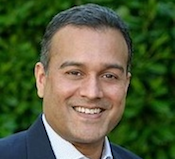 azi Huque was managing and negotiating venture capital deals as a finance controller with Intel Corporation and undertaking a project to determine consumption of computing power around the world. Realizing that only 20% of the global population was being reached by computing technology, he saw an opportunity. Now Huque leads Grameen-Intel, developing a growing portfolio of software products for healthcare and agriculture, targeting micro-entrepreneurs who serve their local communities in emerging nations.
azi Huque was managing and negotiating venture capital deals as a finance controller with Intel Corporation and undertaking a project to determine consumption of computing power around the world. Realizing that only 20% of the global population was being reached by computing technology, he saw an opportunity. Now Huque leads Grameen-Intel, developing a growing portfolio of software products for healthcare and agriculture, targeting micro-entrepreneurs who serve their local communities in emerging nations.
Impact Entrepreneurs and Social Venture Partners invite you to explore social innovation through the lens of these three speakers. Through their stories, a set of musical performances, and the vibrance that just happens when Portland’s social change community gets together, we hope you will be inspired to discover paths to social impact.
The event will take place in the recently renovated Revolution Hall in the historic Washington High School in SE Portland on the evening of May 19. Attendees will explore the space and meet one another over light food, local microbrews and Oregon wine from 5 – 6 p.m., then will gather in the auditorium for a set of performances, presentations, and discussions. The program will close at 7:30.
Social Venture Partners and PSU Impact Entrepreneurs present:
Changemakers Night
Speakers:
Kazi Huque – CEO, Grameen Intel Social Business Ltd
Jeremy Hockenstein – Co-Founder and CEO, Digital Divide Data
Jane Stevens – Founder of ACES Connection & ACEStoohigh.com
Tuesday, May 19
Reception 5-6pm, Interactive presentations and discussion 6-7:30pm
Revolution Hall, Washington High School, 1300 SE Stark, Portland
Tickets: $50 for general admission, $15 for students
Register here: http://bit.ly/1xkn7cs
Contact impactentrepreneurs@pdx.edu with questions
One Word Takeaways from the 2015 Ashoka U Exchange
In 2012, PSU was selected as an Ashoka U Changemaker Campus, a designation honoring our university’s excellence in social innovation education and commitment to making higher education a world-changing experience.
Ashoka U is a highly respected international non-profit organization which believes that: “In a world that is changing faster and faster, students need interdisciplinary, entrepreneurial, and solutions-oriented skills to succeed. Ashoka believes the way colleges and universities can stay relevant is to embed Changemaker skills such as empathy, teamwork, leadership and changemaking into their culture and across their curriculum.” As we recently reported, research shows that employers agree.
Our world in the 21st century requires us, as changemakers, to improve lives and strengthen our planet in a period where the pace of change itself has changed. We can’t keep up – let alone lead – by simply learning, doing, and repeating. In the words of Ashoka’s founder, Bill Drayton, “It’s the change game, not the repetition game. If you don’t understand that, you can’t lead.”
Last week, the three authors of this post were among the 700 attendees at Ashoka U’s annual convening, the Exchange. We celebrated the now 30 Changemaker Campuses, including public universities and private colleges all over the world who are building a global “Everyone a Changemaker” movement.
Starting with one word to express our experiences, these are our reflections.
 Cindy Cooper, Director, Impact Entrepreneurs, School of Business Administration*
Cindy Cooper, Director, Impact Entrepreneurs, School of Business Administration*
“Reinforcing”
The Exchange was reinforcing. It was reinforcing to coalesce with a committed group of dedicated educators and innovators who are in solidarity about the promise of higher education to build changemakers for a better world.
PSU’s mantra is “Let Knowledge Serve the City.” Our expression of this ethos at PSU’s Impact Entrepreneurs is to contribute to creating the conditions that enable people to make choices for good.
These lofty ideals fuel us as inspiring visions of the future should. But the climb is real work, and the air can get thin. We face challenges every day to grow and improve our programs, deliver on goals and measure our impact. We constantly ask ourselves: How do we support more staff, faculty and students in being changemakers? How do we generate more strategic and effective collaborations across campus and with a global community of partners? How do we equip more impact-driven innovators with the resources they need to succeed? How do we know we are generating more happiness and less suffering?
Being among hundreds of individuals candidly sharing their efforts to get the values and skills of changemaking to reach as many people as possible helps us develop better approaches and validates our progress so far. It says we are on the right track, but don’t stop, keep going, aim higher. Reinforcement makes us stronger, more creative and more resilient. It is the meditative oxygen we need to reach our promises to ourselves and each other.
The 2015 Ashoka U Exchange and the chance to connect with a vast network of inspiring leaders in higher education provided a deep breath of reinforcement: a solid foundation of best practices and the esprit de corps to press on.
 Abby Chroman, Project Manager, Impact Entrepreneurs, School of Business Administration
Abby Chroman, Project Manager, Impact Entrepreneurs, School of Business Administration
“Intersections”
Advancing social innovation in higher ed. doesn’t mean leaving behind expertise in policy, or engineering, design, medicine, journalism, or law. It means creating environments where disciplines are integrally connected for real world application. The 2015 Ashoka U Exchange demonstrated intersections among what I see as some of the most important skills, schools, movements, and ideas in the world today.
Packed into a classroom in the classic-looking University Of Maryland campus on the last day of the Exchange, I listened in on a discussion about public policy and social entrepreneurship, particularly in the context of higher education. The panelists were brilliant. They explored the historic context for the existing relationship between academia, social innovation, and public policy, and with active engagement from the audience, closed with practical ways to grow the impact of that intersection.
In another session authors and NYT columnists David Bornstein and Tina Rosenberg along with NYU professor Robert Lyon and instructor Sri Naomi Bishop facilitated a conversation about the power of solutions narratives both as journalistic practice, and as content for curriculum. The discussion brought forth everything from existing structures for publication in news and journals to ways instructors can find relevant tailored materials for lessons, and the tension and importance of in-depth reporting in a fast changing world.
As a Millennial working in social entrepreneurship and higher ed., I’m sensitive to the question about what role higher ed. has if we can’t predict the future. From where I stood in snowy Washington, DC last week, something came into focus for me. The particular role of higher ed. might be changing but it’s not becoming less important. Colleges and universities have the ability to strengthen and empower individuals in deep and complex disciplines to shift and tip systems that span sectors, borders, and schools of thought. What other institution can do that? The more we enforce the intersections of disciplines for real world solutions, the more I want to be a part of this.
 Angela Merrill, Changemaker Campus Liaison, Impact Entrepreneurs, School of Business Administration & Institute for Sustainable Solutions*
Angela Merrill, Changemaker Campus Liaison, Impact Entrepreneurs, School of Business Administration & Institute for Sustainable Solutions*
“Canvas”
Much how the fibers of an artist’s canvas provide a surface from which to paint, the interwoven and reinforced fibers of the community at The Ashoka U Exchange provide students a surface from which to create a masterpiece of the world.
A favorite pastime of mine has always been to draw unguided, yet inspired, doodles on the pages of my sketchbooks. Every line, dot and abstract figure looks different to create a whole and impacting image. The conference format too creates an environment to explore various topics to compose a “big picture.” There were personal development sessions and workshops on systems thinking or “the science of change,” insights on international development as well as the role of social entrepreneurship in social justice.
However, what sparkled were connections with student leaders from various universities. To me, it created a diverse gallery of the initiatives that are thriving with the support of the Ashoka U canvas. A friend from Brown spoke of “Pop-Up Classes” in changemaking, while students from the University of San Diego spoke of their sunny, music-filled social impact career fair while Fordham detailed a program that equips students with consulting skills to gain credit and work experience.
We, as Portlanders, are organically drawn to lead social change, and the canvas surface has been prepped. My question for the students, faculty and staff at Portland State is this:
How do we want our changemaker masterpiece to look?
*A special thank you to reTHINK: PSU and the Institute for Sustainable Solutions for generously supporting our participation in the Ashoka U Exchange.
Meet Our 2015 Social Innovation Incubator Members!
The Impact Entrepreneurs Social Innovation Incubator has emerged from hiatus! After taking a year off while we created our online certificate in the Business of Social Innovation, we are thrilled to be back.
We are excited to be working closely over the next year with four amazing new members. Check them out:
 Construct Foundation is building a portfolio of partners and mutually reinforcing education initiatives to identify and support new models for teaching and learning, prioritizing K-12 students in Portland Metro’s underserved communities.
Construct Foundation is building a portfolio of partners and mutually reinforcing education initiatives to identify and support new models for teaching and learning, prioritizing K-12 students in Portland Metro’s underserved communities.
 Gender Gap Year is closing the gaps in women’s representation, leadership, power and pay through an innovative gap year program in Portland Oregon. Through badging, boldness, action, and self exploration, the year long program empowers women between 18 and 22 to live authentic, connected, and strategic lives of equity.
Gender Gap Year is closing the gaps in women’s representation, leadership, power and pay through an innovative gap year program in Portland Oregon. Through badging, boldness, action, and self exploration, the year long program empowers women between 18 and 22 to live authentic, connected, and strategic lives of equity.
 Lanyi Fan incubates locally-generated solutions and facilitates international relationships to address the high unemployment and environmental problems encroaching on existing livelihoods in West Africa.
Lanyi Fan incubates locally-generated solutions and facilitates international relationships to address the high unemployment and environmental problems encroaching on existing livelihoods in West Africa.
The Pathways to Prosperity Initiative, an intrapreneurial program of nonprofit Self Enhancement Inc. (SEI), provides at-risk urban youth and their families in the Portland area “with the knowledge, skills and support needed to leverage economic opportunities and increase financial capability.”
Meet past members, find out more about the Social Innovation Incubator, and stay tuned to this blog for upcoming interviews with the inspiring founders from the 2015 class!
March 2, 2015 at 12:34 pm Impact Entrepreneurs at Portland State University Leave a comment
Pathways to Changemaking
This post was contributed by Angela Merrill, Undergraduate at Portland State University’s Urban Honors College & Changemaker Campus Liaison
“Wherever we are in the world, we can commit ourselves to change.”
– Tichelle Sorenson, Director of the Portland State MBA
Since learning the term ‘social entrepreneurship,’ as a senior in high school, I have been presented with a variety of definitions for it. From Mohammed Yunus at the Grameen Bank, who was called a social entrepreneur for his work building the microfinance industry, to CanCity in Brazil, which empowers trash collectors to create furniture from melted-down cans, new ventures redefine the field every day.
Now, as the new student intern with PSU’s Impact Entrepreneurs, I’m not just out to define social entrepreneurship with a boundary for where it starts and stops because realistically, not everyone wants or needs to become a social entrepreneur. Finding an authentic personal journey to make change is still an important step towards creating more happiness (and less suffering) in our world.
Impact Entrepreneurs and the PSU Alumni Association share my conviction. Earlier this month they invited three changemakers to present at a lively event at Bridgeport Brewery. They each talked about finding their unique path to creating positive social impact throughout their lives and careers. Here my takeaways from their stories.
Todd Ferry
“Know what’s out there, contact an expert and help good people do good things.”
Currently a Research Associate at the Center for Public Interest Design (CPID) at PSU’s School of Architecture, Todd started off studying philosophy as an undergrad and became involved in various NGOs at rape and refugee call centers. Increasingly, he found himself needing to solve problems of design and, after watching a PBS documentary on Public Interest Design, decided to become an architect to work with (and not for) communities of underserved populations. Not only did Brad Pitt narrate the documentary, but it also featured CPID’s own director Sergio Palleroni – a leader in the field of Public Interest Design.
Rhian Rotz
“Subscribe to be a lifelong learner and connect with those experts you might not normally connect with. Be curious. Agility is the strongest muscle, so being adaptable and having transferrable skills will help you be ready to tell your story.”
A self-proclaimed storyteller, Rhian is a serial “intrapreneur” who leads Corporate Citizenship at Waggener Edstrom Worldwide – one of the largest public relations firms in the world. She enables change by aligning the overall strategy of her clients and employees to create purpose and profit within the corporate giant.
At around 5pm each day, an alarm goes off on Rhian’s phone that says “Was today worth it?” She says the day she answers no to the question above, it’s the day to quit.
In the same way she aligns other business strategies with purpose, she too has learned that aligning herself with her company and personally defining impact is a key step in the journey.
Eric O’Connell
“Have the audacity to step out of a predetermined role. If you have a crazy idea, do it.”
The skills software engineers employ are in high demand across sectors, and Eric’s story is no different. Although a first job working for a stock analysis firm paid him well monetarily, something didn’t feel quite right. After being fired from this job, he listened closely to his mind/body connection to discover where his passion was leading him – to make things and share them with people. Now a technologist with Idealist.org, he is able to do this by creating a platform that directly facilitates online users to find their own pathway to changemaking. He says, “At Idealist, we don’t necessarily have the skills to save the whales. But if you want to save the whales, we want to help you find other people who want to save the whales and can help you do it.”
It doesn’t matter to me that Eric, Todd, and Rhian didn’t introduce themselves as social entrepreneurs. They have found creative and pragmatic ways to solve the problems they see in their lives and they have crafted careers to address those issues. They are changemakers who inspired the audience to find their own pathways to changemaking.

